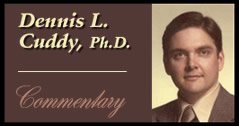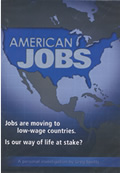Other
Cuddy
Articles:
Sept. 11:
Hold Government
Accountable
An
Economic Assault on
African-Americans and Others in The US
OVERLY OPTIMISTIC VIEW OF IRAQI VOTING
By
Dennis L. Cuddy, Ph.D.
February 4, 2005
NewsWithViews.com
The Sunday morning talk show commentators were absolutely gushing in their exuberance over the 60-72% election turnout on January 30 by Iraqi voters in what President Bush called "a resounding success." Chris Wallace of Fox News Sunday served up softball questions to his guest, the new Secretary of State Condoleezza Rice. And he sat in silence as she expressed her gladness that Andrew Young attended her installation ceremony, despite the fact that Young has been a vehement opponent of many conservative initiatives. Also, we should not forget that Secretary Rice's mentor was Joseph Korbel, the father of Madeleine Albright (President Clinton's Secretary of State).
It seems that in the Bush administration, a lack of competence is also a plus, as Dr. Rice was promoted from National Security Adviser to Secretary of State, even though she failed to provide national security from the 9-11 attacks, which were easily preventable (BEFORE 9-11, in my books SECRET RECORDS REVEALED and THE GLOBALISTS, I warned there could be terrorist attacks).
And Secretary of Defense Donald Rumsfeld was asked to remain in that position, even though he failed to foresee correctly Saddam Hussein's guerrilla warfare strategy in the war with Iraq (which I referred to on page 78 of my COVER-UP book BEFORE the war began).
But it was not just Fox News Sunday that was ecstatic over the Iraqi vote, but ABC's "This Week" Sunday commentators and others as well. However, this is extremely dangerous, just like the ebullience expressed when American forces quickly reached Baghdad after the war began.
What apparently has been lost on these commentators is what the insurgents' strategy has been. It has never been to confront American military might on our terms, but rather at times and places of their choosing. They did not attack us forcefully on our way from Kuwait to Baghdad, but waited until we left battle formation and dispersed into smaller policing patrols, more easily attacked by roadside bombs, rocket-propelled grenades, etc.
The same thing is true regarding this election. When we secure a particular polling place with a strong military presence, the insurgents know it would be futile for them to attack then and there. Rather, most of the time, the insurgents will pick the times and places of confrontation.
In addition, the jubilance over the 60-72% voter turnout is also misleading. This is because in many Shiite areas, the turnout was 95%, and with the Shiites comprising about two-thirds of Iraqis, that means Sunni Arab turnout was quite low. How would we view our national election in which there was a very high turnout in 80% of the states, but in 20% of the states turnout was very low? Would we consider that truly representative?
To the Sunni Arabs, this is critical because in Iraq there is no separation of church and state, and Iraq will be under majority Shiite Islamic law. How would American Protestants like it if the U.S. was under Catholic law, or vice versa? Even our own Constitution was originally rejected by the American people until a Bill of Rights was added, protecting individual and minority from the tyranny of the majority.
In Iraq, success will be measured by the extent to which Sunni Arab minority rights can be GUARANTEED. If, however, the insurgents convince the general Sunni Arab population that the American military are occupiers protecting the enforcement of Shiite Islamic law, then the insurgents will continue to have enough tacit support (or at least non-vigorous opposition) among the Sunni Arabs to threaten the stability of the new Iraqi government.
Just as the Bush administration was badly mistaken when it believed that turning over power to an interim government in Iraq last summer would dampen insurgents' opposition, they and their media allies might be once again misleading the American people regarding the importance of the January 30 vote there.
My own sense is that the battle will continue unabated, just like after the turnover of power last summer. The insurgents have a long-range strategy, and they will continue to pick the times and places of their attacks, which increasingly will be focussed upon Sunnis who cooperate with American efforts. This is the nature of guerrilla warfare, whether in the jungles of Vietnam or the urban areas of the Sunni triangle. So far, we have not provided the security necessary for most Sunni Arabs to feel they can openly support us against the insurgents. And without that security and the guarantee that Sunni Arabs will not have to live under Shiite Islamic law, the insurgency most likely will continue.
The single nationwide constituency system makes it difficult for Sunnis to win seats in the assembly, which will first pick a president and two deputies. Therefore, the main Sunni groups such as the Muslim Clerics Association and the Iraqi Islamic Party may simply persuade two-thirds of the Sunni voters in at least 3 provinces north and west of Baghdad to veto whatever draft of a Constitution the assembly adopts in a referendum this coming October. Under rules adopted last year, that is all that is necessary to defeat it. And if the Sunnis continually choose this option to defeat any Constitution based upon Shiite Islamic law, where would that leave the U.S.?
� 2005 Dennis Cuddy - All Rights Reserved
Order Dennis Cuddy's new book "Cover-Up: Government Spin or Truth?"
Sign Up For Free E-Mail Alerts
E-Mails are used strictly for NWVs alerts, not for sale
Dennis Laurence Cuddy, historian and political analyst, received a Ph.D. from the University of North Carolina at Chapel Hill (major in American History, minor in political science). Dr. Cuddy has taught at the university level, has been a political and economic risk analyst for an international consulting firm, and has been a Senior Associate with the U.S. Department of Education.
Cuddy has also testified before members of Congress
on behalf of the U.S. Department of Justice. Dr. Cuddy has authored or
edited seventeen books and booklets, and has written hundreds of articles
appearing in newspapers around the nation, including The Washington Post,
Los Angeles Times and USA Today. He has been a guest on numerous radio
talk shows in various parts of the country, such as ABC Radio in New York
City, and he has also been a guest on the national television programs
USA Today and CBS's Nightwatch.
My own sense is that the battle will continue unabated, just like after
the turnover of power last summer. The insurgents have a long-range strategy,
and they will continue to pick the times and places of their attacks,
which increasingly will be focussed upon Sunnis who cooperate with American
efforts.










